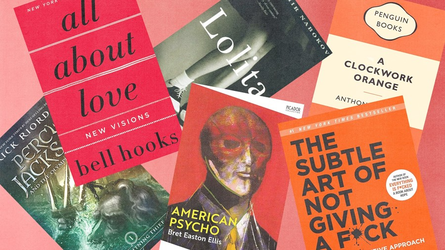
Reading is hot. As John Waters once said, “if you go home with somebody, and they don’t have books, don’t fuck them.” But what if you go home with somebody, and they do have books, but the sorts of books they have are a little… questionable? What if they only read Michel Houellebecq? What about a grown man whose shelves are filled with nothing but young adult fiction like the Percy Jackson series? Should you fuck somebody who says Holden Caulfield is their idol?
It goes without saying that liking Lolita does not make you a pedophile, nor does enjoying American Psycho mean you’re a violent misogynist. And I suppose there are worse things a person could do than enjoy reading fiction aimed at 12-year-olds. But I do still think our literary tastes – and, maybe more importantly, the way we interpret literature – can reveal a lot about our character. For example, if someone has read A Clockwork Orange as a blistering critique of the normalisation of state violence, I’m more inclined to fancy them than if they’ve come away from it thinking that beating up old men and killing women is cool, actually.
Which titles would ring alarm bells for the Dazed team if we were to spot them on a date’s bookshelves? Read on for our very serious list of ‘red flag’ books.
A CLOCKWORK ORANGE, ANTHONY BURGESS
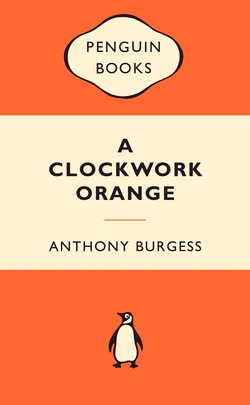
A CLOCKWORK ORANGE
Set in the near future, Anthony Burgess’ 1962 novel A Clockwork Orange follows Alex, a 15-year-old juvenile delinquent, as he terrorises members of his local community with his equally thuggish friends. It raises interesting questions about free will (“Is a man who chooses to be bad perhaps in some way better than a man who has the good imposed upon him?”) and exposes the violence that is so often baked into the state; Alex is no hero – he’s a rapist and murderer – but, the novel asks, are the police officers and prison guards who beat and torture him into submission really any different? It’s a thought-provoking read and probably one of my favourite books, but if the person you’re dating thinks Alex is some kind of aspirational antihero, it’s safe to say you should probably run a mile. (SS)
THE CATCHER IN THE RYE, JD SALINGER
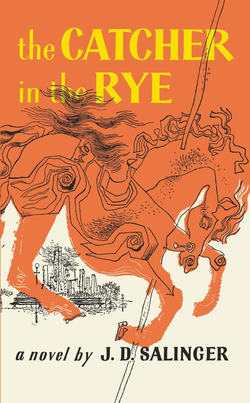
THE CATCHER IN THE RYE
The Catcher in The Rye follows 16-year-old protagonist Holden Caulfield as he mopes around New York after being expelled from an elite boarding school. It’s a classic coming-of-age story, but the novel isn’t a straightforward, maudlin tale of teen angst. It delves into themes ranging from alienation, to loneliness, to identity, to grief, while Holden is an extremely compelling narrator (if a little annoying, but what 16-year-old isn’t?). He’s since become a sort of patron saint for the disillusioned in the 60-odd years since the novel’s publication in 1951 – and unfortunately he’s been idolised by some pretty questionable people in that time, including Mark David Chapman, the man who shot and killed John Lennon, and more recently, incels. So, yeah, it’s no surprise the book has become regarded as a little red flaggy. Tread carefully if you spot the book on your situationship’s shelves. (SS)
THE ALCHEMIST, PAOLO COELHO
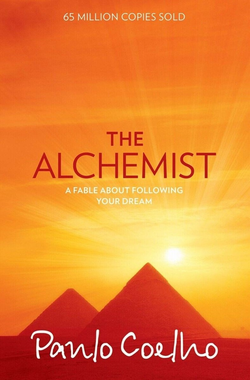
THE ALCHEMIST
I don’t know what this book is about, but an ex of mine used to bang on about it all the time and it was very annoying. (SS)
ANY SELF-OPTIMISATION BOOK
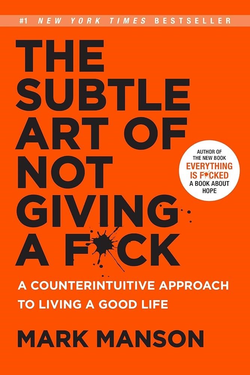
THE SUBTLE ART OF NOT GIVING A F*CK
I’ve always been perplexed by the idea that there are large numbers of obnoxious literary bros out there, bragging about having read Infinite Jest and terrorising the people around them with Jack Kerouac quotes. I have met a handful of men like that in my life, but they don’t exist as a meaningful constituency – most men simply don’t read fiction, if they read at all. If I met someone who loved Pynchon, DeLillo, Bolaño or any other author from the “dude bro” canon, I’d be more inclined to think of them as interesting than as pretentious.
So in terms of what would be a red flag for me, I’ll go with any kind of life-hack book, particularly if it is focused on financial success and doubly so if it has a swear word in the title (Sort Your F*cking Life Out: A Guide to Building Passive Income and Landlording Like a Boss.) If someone was really into books like this, I would assume they are boring, materialistic and vaguely right-wing, and that they would consider me lazy and unambitious, which is unfair: I might not have a property portfolio, but I have read Infinite Jest – for which I deserve great deal of admiration and respect. (JG)
PERCY JACKSON & THE OLYMPIANS, RICK RIORDAN
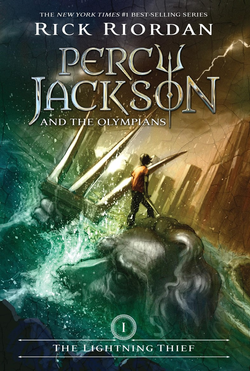
PERCY JACKSON & THE OLYMPIANS
It should go without saying that, in 2025, Harry Potter is the ultimate red flag book. I don’t think everyone who shows up at Kings Cross for ‘Back to Hogwarts Day’ is transphobic, but it does indicate a certain indifference or obliviousness to the issue – as well as being deeply corny. But in recent years, as JK Rowling has become more vocal in her “gender-critical” views, I’ve noticed a parallel trend: people recommending the Percy Jackson series as a non-problematic alternative. Some fans have even tried to reframe these books as radical texts: Percy Jackson, they argue, encourages critical thinking and has much better themes of class solidarity. While Harry Potter becomes a cop, Percy Jackson is a revolutionary figure – a cross between the young Che Guevara and Luigi Mangione – who dismantles an unjust system. While Harry Potter sneers at Hermione’s efforts to emancipate the Hogwarts elves, Percy Jackson is committed to doing the work, holding himself accountable, and affecting meaningful change at a grassroots level.
And to those people I would say: you are not actually faced with a binary choice between Harry Potter and Percy Jackson. I’m sure the latter is a perfectly fine children’s series, although I remember reading the first one when I was, like, 11 and thinking “I’m too old for this.” I try not to be too snobbish about other people’s tastes in fiction, because I understand the appeal of reading purely for pleasure and I enjoy some very pulpy thrillers and crime novels myself (while I’m not into romance or fantasy, I get it.) But there are so many fun, easy, plot-driven books for adults, and I don’t really get why you’d opt instead for a series aimed at 9-12 year olds: apart from anything, I want a bit of sex and violence in my trashy fiction, maybe even some swear words if I’m feeling particularly risqué. It doesn’t make you a bad person, or stupid, or whatever, but I would struggle to feel any romantic or sexual desire towards a grown man whose favourite book was Percy Jackson. (JG)
AMERICAN PSYCHO, BRET EASTON ELLIS

AMERICAN PSYCHO
American Psycho is a pretty good novel and I don’t think owning a copy is a red flag. However, if it was a straight man’s favourite book, that would give me pause… It’s a work of satire and the message obviously isn’t “misogyny is cool”, but it’s just so relentless, lurid and explicit in its depiction of violence against women, to the point where I would think, “why are you enjoying this so much??” I don’t believe in judging people for enjoying transgressive works of art, but that suspicion has been borne out to some extent by the ongoing reappraisal of both the novel and the film adaptation by the far-right. So if a man you’re dating loves American Psycho, just try to make sure this is due to its trenchant critique of consumer-capitalism, and not because he thinks Patrick Bateman is a based alpha giga-chad. (JG)
ANY BOOK BY MICHEL HOUELLEBECQ
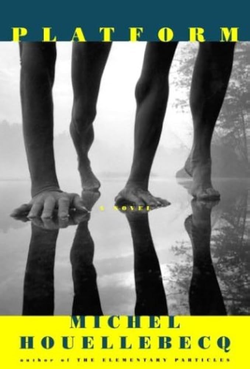
PLATFORM
If they can pronounce Michel Houellebecq’s last name without Googling it first, disengage immediately. Yes, the French author is an acclaimed bestseller in his homeland, hailed as a prophetic and darkly humorous chronicler of neoliberal decay, but the 2025 reader is just as likely to arrive at his work via a dangerous mix of Bret Easton Ellis recommendations, episodes of Red Scare, and vaguely right-wing meme pages. The most obvious entry point is his 1998 book Atomised – a nihilistic novel for the grown-up American Psycho reader – but 2001’s Platform, with its focus on sex tourism and rampant Islamophobia, is an even bigger and harder-to-justify red flag. (TW)
LOLITA, VLADIMIR NABOKOV

LOLITA
Vladimir Nabokov’s Lolita is, arguably, one of the original Problematic Books. Many publishing houses turned it down before it was published in the 1950s, and who can blame them for not wanting to risk their reputation on an “erotic novel” about a grown man who kidnaps a 12-year-old girl? In 1955, it finally hit shelves thanks to a Paris publisher who specialised in “pornographic trash” and has regularly been named one of the best novels of all time ever since, plus a firm favourite of 2010s Tumblr girls and lascivious older guys. Relatedly: the 2010s also saw Bradley Cooper (3
But I’m going to put my neck on the line and say: that’s also why it’s kind of a masterpiece. Nabokov’s writing is so alluring, and often very funny, that for a moment we might forget the sordid acts we’re reading about and start to really enjoy ourselves – to lose sight of what we find morally reprehensible as we get lost in the author’s language games. Because of this, we’re repeatedly forced to confront the dangerous power of language and beauty in the wrong hands. At least, that was the thesis of my long-lost undergraduate dissertation. But yes, if you’re just reading Lolita and yearning for a Humbert-style road trip with a young ‘nymphet’... big, big red flag. (TW)
ALL ABOUT LOVE, BELL HOOKS
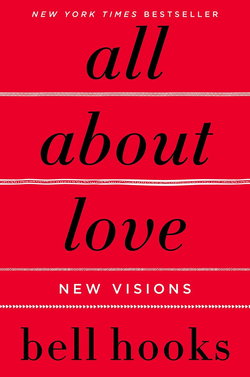
ALL ABOUT LOVE
I actually don’t think All About Love is inherently a red flag book. But it can be alarming to many when certain people (men) have this book in their possession. When I think about All About Love, I think of that picture a guy took of himself on a beach reading it, and everyone commented that he was only on page one and was already taking pictures of himself
In her essay Feminist Polemic Now! for Lux, Grace Byron writes about hooks as a feminist polemicist (a person who writes strongly worded, passionate, and confrontational arguments that may not always be right but always make us think, or rethink, the world around us). Byron writes: “Whether because she called Beyoncé a culture terrorist or said that love and abuse cannot coexist, these moments of polemical rhetoric force us to confront our own preconceived notions of girlbossery and intimate relationships.” And that’s why I love bell hooks so much! She may be a red flag to many (she was also a landlord, yikes), but she and her writing will always be a green flag to me. (HJ)
ANYTHING BY FYODOR DOSTOEVSKY

CRIME AND PUNISHMENT
If you’re seeing someone who is reading a book by Fyodor Dostoevsky, good news! They have a brain cell. The bad news, however, is that that brain cell is deficient in serotonin; this person likely takes themselves quite seriously, has a morose outlook on life, and struggles with chronic depression (at least, if they didn’t when they started it, they will have developed it by the time they’ve finished it). Obviously Dostoevsky’s books are some of the most profound explorations of the human condition in literature, delving into the nature of man, of God, of good, and of evil. But his characters are often spiralling into insanity of some description or contemplating a violent crime – so if the person you’re seeing says they relate to Rodion Raskolinov or Mitya Karazamov in any way, shape or form, run a mile. You have been warned. (TS)
Article Link
Archive
Last edited:
